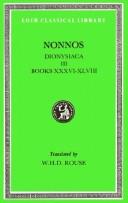| Listing 1 - 3 of 3 |
Sort by
|
Book
ISBN: 9789004266841 9789004272248 9004266844 9004272240 Year: 2014 Publisher: Leiden, Netherlands : Brill,
Abstract | Keywords | Export | Availability | Bookmark
 Loading...
Loading...Choose an application
- Reference Manager
- EndNote
- RefWorks (Direct export to RefWorks)
Raffaele Pettazzoni (1883–1959), Professor of the History of Religions at the University of Rome and one of the leading historians of religions in the twentieth century, maintained a long correspondence with Herbert Jennings Rose (1883–1961), the gifted Canadian scholar who was Professor of Greek at St Andrews and is best known for his work in the field of ancient religion and folklore. These letters, spanning the years 1927 to 1958, bear witness to the close relationship between the two scholars and focus on two of Pettazzoni’s books, both translated by Rose: Essays on the History of Religions (1954) and The All-Knowing God (1956). They also shed light on Pettazzoni’s initiative to the foundation of the journal NVMEN (1954), and reveal Rose’s brilliant personality.
Religion --- Philosophy. --- Philosophie --- Pettazzoni, Raffaele, --- Rose, H. J. --- Correspondence --- 291.11 --- Godsdienst:--oorsprong; ontwikkeling; natuur --- 291.11 Godsdienst:--oorsprong; ontwikkeling; natuur --- Rose, H. J., --- Rose, Herbert Jennings, --- روز، ھ. ج. --- Correspondence.

ISBN: 0674993799 Year: 1995 Publisher: Cambridge Harvard University Press
Abstract | Keywords | Export | Availability | Bookmark
 Loading...
Loading...Choose an application
- Reference Manager
- EndNote
- RefWorks (Direct export to RefWorks)
Annotation Nonnos of Panopolis in Egypt, who lived in the fifth century of our era, composed the last great epic poem of antiquity. The Dionysiaca, in 48 books, has for its chief theme the expedition of Dionysus against the Indians; but the poet contrives to include all the adventures of the god (as well as much other mythological lore) in a narrative which begins with chaos in heaven and ends with the apotheosis of Ariadne's crown. The wild ecstasy inspired by the god is certainly reflected in the poet's style, which is baroque, extravagant, and unrestrained. It seems that Nonnos was in later years converted to Christianity, for in marked contrast to the Dionysiaca, a poem dealing unreservedly with classical myths and redolent of a pagan outlook, there is extant and ascribed to him a hexameter paraphrase of the Gospel of John. The Loeb Classical Library edition of the Dionysiaca is in three volumes.

ISBN: 0674993918 Year: 1985 Publisher: Cambridge Harvard University Press
Abstract | Keywords | Export | Availability | Bookmark
 Loading...
Loading...Choose an application
- Reference Manager
- EndNote
- RefWorks (Direct export to RefWorks)
Annotation Nonnos of Panopolis in Egypt, who lived in the fifth century of our era, composed the last great epic poem of antiquity. The Dionysiaca, in 48 books, has for its chief theme the expedition of Dionysus against the Indians; but the poet contrives to include all the adventures of the god (as well as much other mythological lore) in a narrative which begins with chaos in heaven and ends with the apotheosis of Ariadne's crown. The wild ecstasy inspired by the god is certainly reflected in the poet's style, which is baroque, extravagant, and unrestrained. It seems that Nonnos was in later years converted to Christianity, for in marked contrast to the Dionysiaca, a poem dealing unreservedly with classical myths and redolent of a pagan outlook, there is extant and ascribed to him a hexameter paraphrase of the Gospel of John. The Loeb Classical Library edition of the Dionysiaca is in three volumes.
| Listing 1 - 3 of 3 |
Sort by
|

 Search
Search Feedback
Feedback About
About Help
Help News
News